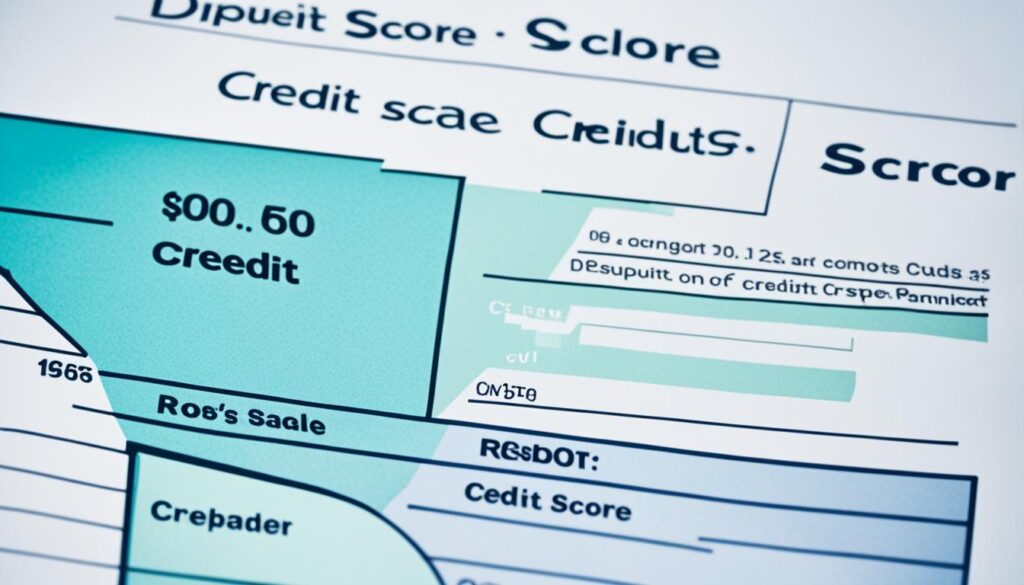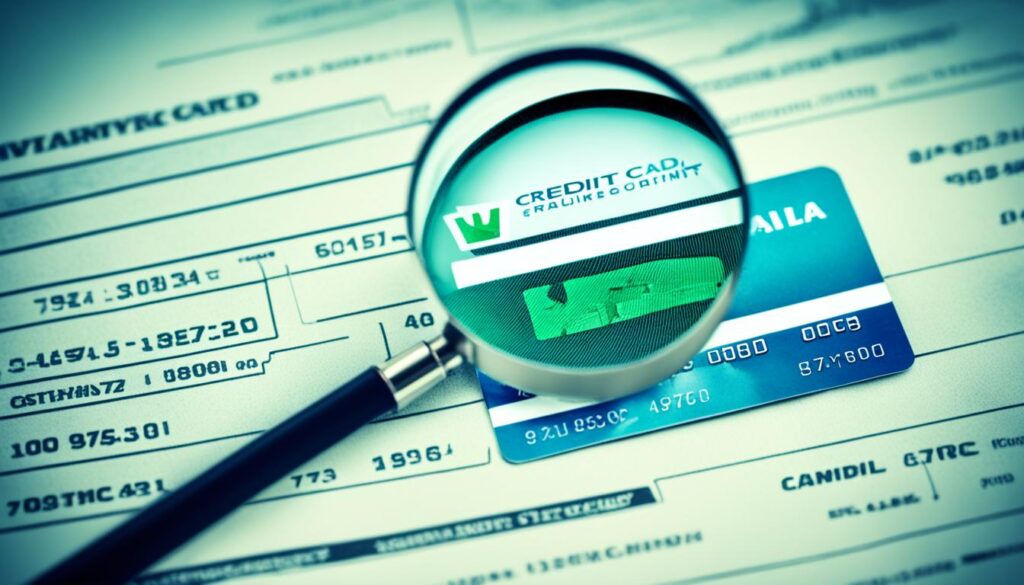Identity theft can damage your credit score. Quick action is vital if you’re a victim. Disputing identity theft on your credit report is crucial for credit repair.
This guide will help you work with credit agencies. You’ll learn how to set things right and protect your financial future.
We’ll cover steps to dispute fake entries on your credit report. You’ll learn how to gather proof and file formal complaints. This process will help restore your good name.
Key Takeaways
- Act quickly to minimize credit score damage from identity theft
- Gather all evidence of fraudulent activity on your credit report
- Contact the three major credit reporting agencies to report the theft
- File a formal dispute with detailed documentation
- Work with creditors to remove false accounts
- Implement long-term credit protection measures
- Know your rights and available resources for identity theft victims
Understanding Identity Theft and Its Impact on Credit Reports
Identity theft can ruin your credit history. It happens when someone uses your personal info without permission. Let’s explore how it affects your finances and what to watch for.
What is identity theft?
Identity theft is when a criminal steals your personal data for fraud. They might use your name, Social Security number, or credit card details. This can lead to unauthorized purchases or new accounts in your name.
How identity theft affects your credit report
Thieves using your identity can severely damage your credit report. They might max out your cards or open new credit lines. This can result in late payments and bad marks on your credit history.
Common signs of identity theft on credit reports
Regular credit monitoring helps spot identity theft early. Here are some red flags to watch for:
- Unfamiliar accounts or inquiries
- Sudden drops in your credit score
- Incorrect personal information
- Unexpected changes in account balances
| Warning Sign | Potential Impact | Action to Take |
|---|---|---|
| Unfamiliar accounts | Lower credit score, increased debt | Contact credit bureaus and file a dispute |
| Unexpected inquiries | Reduced credit score | Place a fraud alert on your credit report |
| Wrong personal info | Difficulty accessing accounts | Update information with credit bureaus |
| Strange balance changes | Potential financial loss | Contact your bank or credit card company |
Stay alert and act fast to reduce identity theft damage on your credit report. If you notice these signs, take quick action to protect your financial future.
Steps to Take Immediately After Discovering Identity Theft
Swift action is crucial after discovering identity theft. It helps protect your financial future and repair your credit. Here are key steps to take right away:
Place a fraud alert with a major credit reporting agency. This notifies creditors to verify your identity before granting credit. The agency you contact will inform the others.
Contact your financial institutions to report the theft. Freeze your accounts to prevent unauthorized transactions. Change all your passwords and PINs.
File an identity theft report with the Federal Trade Commission (FTC). This document helps dispute fraudulent charges and accounts with creditors and credit bureaus.
Quick action is key in mitigating the damage of identity theft and starting the credit repair process.
Consider placing a security freeze on your credit reports. This makes it harder for thieves to open new accounts. The Fair Credit Reporting Act allows free placement and lifting of freezes.
| Action | Purpose | Timeline |
|---|---|---|
| Place fraud alert | Notify creditors of potential fraud | Immediately |
| Contact financial institutions | Freeze accounts and prevent further fraud | Within 24 hours |
| File FTC report | Create official record for disputes | Within 48 hours |
| Place security freeze | Prevent new account openings | Within 72 hours |
These steps help protect you from further harm. They also lay the groundwork for effective credit repair. Stay vigilant and monitor your credit reports regularly.
Gathering Evidence: Documenting the Identity Theft
Collecting evidence is vital when you suspect identity theft. It helps build a strong case to dispute credit report marks. Let’s explore how to gather the needed documentation.
Collecting Financial Statements
Start by gathering all your financial statements. This includes bank accounts, credit cards, and loan documents. Look for unfamiliar transactions or accounts you didn’t open.
These records form the basis of your identity theft claim. They provide proof of unauthorized activity on your accounts.
Obtaining Credit Reports
Get copies of your credit reports from all three major bureaus. Review them carefully for any suspicious activity. Look for new accounts, hard inquiries, or addresses you don’t recognize.
These reports show your credit history and potential fraud. They’re crucial for spotting unauthorized changes to your credit profile.
Filing a Police Report
File a police report about the identity theft. This official document proves you’ve been a victim of fraud. It’s key when disputing fraudulent accounts with creditors and bureaus.
Thorough documentation is your best defense against identity theft. It helps you reclaim your credit history and remove fraudulent marks. Regular credit monitoring can catch identity theft early, making disputes easier.
Contacting the Three Major Credit Reporting Agencies

Equifax, Experian, and TransUnion are vital for credit repair and identity theft protection. These agencies help uphold the Fair Credit Reporting Act. Contact them to report fraud and safeguard your credit.
Start by placing a fraud alert on your credit reports. This free service warns potential creditors to verify your identity carefully. You only need to contact one agency, as they’ll inform the others.
For stronger protection, consider a security freeze. This locks your credit file, making it harder for fraudsters to open new accounts. You’ll need to contact each agency separately for this.
“A security freeze is like a lock on your credit file. Creditors can’t access it without your permission, which helps prevent new accounts from being opened fraudulently.”
Here’s a quick guide to contacting the major credit reporting agencies:
| Agency | Phone | Website |
|---|---|---|
| Equifax | 1-800-685-1111 | www.equifax.com |
| Experian | 1-888-397-3742 | www.experian.com |
| TransUnion | 1-888-909-8872 | www.transunion.com |
Quick action is crucial in identity theft cases. Contacting these agencies promptly helps protect your financial future. It’s a key step in your credit repair journey.
Filing a Formal Dispute with Credit Bureaus
Spotting identity theft on your credit report? Filing a formal dispute is crucial. This step removes incorrect information from your record. It’s key for credit repair.
Writing an Effective Dispute Letter
Your dispute letter should be clear and fact-based. Include your full name, address, and account number. State which information you’re disputing and why it’s wrong.
Providing Supporting Documentation
Back up your claims with solid evidence. This might include:
- Copies of police reports
- Proof of identity
- Account statements
- Correspondence with creditors
Strong documentation makes your case more convincing. The more proof you provide, the better your chances.
Following Up on Your Dispute
After submitting, mark your calendar. Credit bureaus have 30 days to investigate and respond. If silent, follow up. Keep copies of all communications.
Continue to monitor your credit report for changes. Stay alert for any updates or modifications.
“Persistence is key when disputing errors on your credit report. Don’t give up if your first attempt doesn’t succeed.”
Disputing errors is your right under the Fair Credit Reporting Act. Stay vigilant in your credit repair efforts. Ensure your report accurately shows your financial history.
Will Removing a Dispute Hurt My Credit?
Removing a dispute won’t directly impact your credit score. What matters is the dispute’s outcome and its effect on your credit history.

Credit bureaus investigate when you file a dispute. They’ll correct any errors they find. This can lead to positive changes in your credit score.
If disputed information is accurate, removing the dispute won’t hurt your credit. The information stays on your report. Focus on building a positive credit history going forward.
“Your credit score is a reflection of your credit behavior, not the act of disputing or removing disputes.”
To keep a healthy credit profile, try these steps:
- Pay bills on time
- Keep credit utilization low
- Regularly check your credit reports
- Address any inaccuracies promptly
Your credit score depends on various factors. Disputes ensure accuracy but are just one part. Good credit habits are key for long-term success.
Working with Creditors to Remove Fraudulent Accounts
Finding identity theft on your credit report requires swift action. Contact each company where fake accounts were opened in your name. Your aim is to clear these negative marks from your credit history.
Contacting Individual Creditors
Create a list of all affected creditors. Call their fraud departments and explain your situation. Keep detailed notes of each call, including dates, times, and representative names.
Providing Proof of Identity Theft
Creditors need evidence to back your claim. Be ready to send key documents to support your case.
- A copy of your police report
- Your FTC Identity Theft Report
- A government-issued ID
- Proof of address
These documents help prove your identity and the theft claim.
Negotiating Account Removal
After providing proof, ask the creditor to remove the fake account. Request a letter confirming the fraudulent account and its removal from your credit history.
Stay persistent in your efforts. Some creditors may resist, but stand your ground. The Fair Credit Reporting Act protects your rights in these cases.
Implementing Long-Term Credit Protection Measures

Set up long-term safeguards for your credit after identity theft. Sign up for credit monitoring services to spot potential fraud quickly. These tools alert you to changes in your credit report.
Consider freezing your credit with all three major bureaus. This extra security makes it harder for thieves to open new accounts. You can still access your credit by temporarily lifting the freeze.
Regular credit checks are essential. The Fair Credit Reporting Act gives you one free credit report from each bureau yearly. Review these reports for any suspicious activity.
Credit counseling can help if you’re struggling with finances post-theft. These services offer guidance on budgeting and rebuilding your credit score.
- Set up fraud alerts on your credit files
- Use strong, unique passwords for all financial accounts
- Be cautious about sharing personal information online
Stay informed about the latest identity theft tactics. Knowledge is power in protecting your financial future. These measures will help you safeguard your credit and prevent future theft attempts.
Legal Rights and Resources for Identity Theft Victims
Identity theft victims have legal protections and resources to aid recovery. The Fair Credit Reporting Act safeguards consumer rights. Let’s explore the available support systems.
Fair Credit Reporting Act Protections
The FCRA allows you to dispute inaccurate information on your credit report. This includes fraudulent accounts opened by identity thieves. Credit bureaus must investigate disputes within 30 days.
They must remove any unverified information from your report. This process helps protect your credit score from identity theft damage.
Identity Theft Resource Center
The Identity Theft Resource Center offers free support to victims. They guide on credit repair strategies and help navigate the recovery process. Their services include:
- One-on-one case management
- Document replacement assistance
- Emotional support
Federal Trade Commission Resources
The FTC’s IdentityTheft.gov website is a valuable tool for victims. It offers:
- Step-by-step recovery plans
- Sample letters for disputing fraudulent charges
- Tips on preventing future identity theft
Credit counseling services can help create a plan to rebuild your credit. These professionals offer tailored advice for your situation. Recovery takes time, but with support, you can restore your financial health.
Conclusion
Identity theft can devastate your credit report and finances. Quick action is vital to limit the damage. This guide helps you dispute identity theft and rebuild your financial health.
The credit score impact of identity theft can be severe. Review your credit reports often and address issues promptly. Credit repair takes effort, but you can overcome identity theft challenges.
Ongoing credit monitoring is crucial for protection. Stay alert and use available tools to safeguard your financial future. Don’t hesitate to seek help from professionals if needed.
Consider online credit repair services if you feel overwhelmed. Your financial security matters, so take action to protect your credit now.

